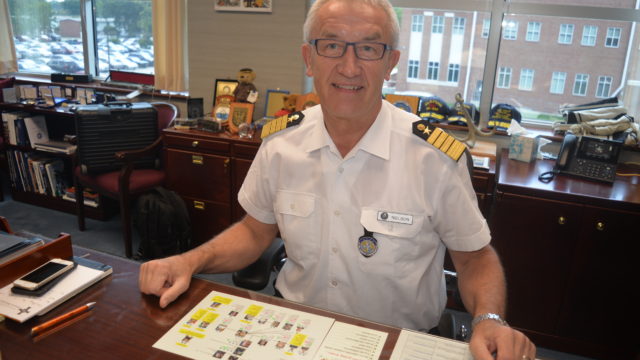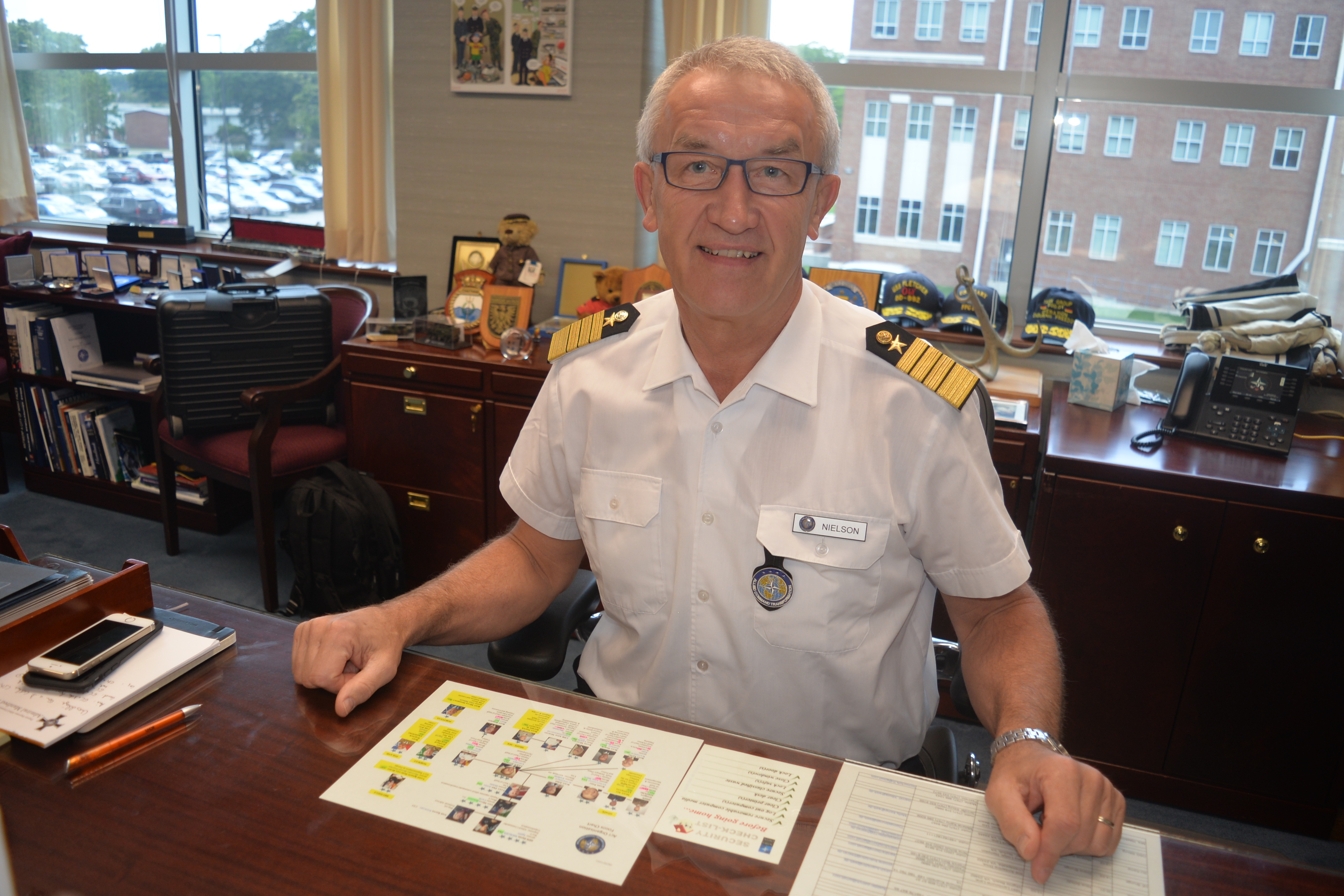
(German Admiral Manfred Nielson in his office at NATO’s Allied Command Transformation headquarters in Norfolk)
By Jeff Maisey
German Admiral Manfred Nielson is the new Deputy Supreme Allied Commander Transformation (DSACT) based at NATO’s Allied Command Transformation (ACT) headquarters in Norfolk.
Like most NATO personnel assigned to Norfolk, Admiral Nielson is scheduled for a three-year tour of duty. The post came as a surprise to the longtime commander.
“To be honest it was completely unexpected for me that I would get an appointment in the United States,” said Admiral Nielson. “It was an honor and privilege for me. I am happy to have the opportunity to work in this type of international environment.”
Manfred Nielson was born in February 25, 1955 in Dorsten, Germany. He joined the German Navy as a reserve officer and graduated from Helmut Schmidt University of the Bundeswehr in Hamburg in 1978. He went on to complete his underwater weapons specialist training in 1981.
Admiral Nielson has had a distinguished career having commanded units at all levels ranging from the 6th Minesweeper Squadron (1996-97) to being appointed Chief of Staff Joint Support Services of the Bundeswehr in 2012.
Admiral Nielson views his appointment to NATO ACT as potentially being at an interesting point in world history.
“I joined the armed forces in 1973 during the Cold War. Many people worldwide thought that the Cold War was over after Reunification in Germany. The opposite is the case. The unexpected aggressive behavior of Russia occupying Crimea gives a lot of questions to the international community.”
An article this year in Foreign Affairs magazine stated, “Russian President Vladimir Putin’s seizure of the Crimean Peninsula from Ukraine in early 2014 was the most consequential decision of his 16 years in power. By annexing a neighboring country’s territory by force, Putin overturned in a single stroke the assumptions on which the post–Cold War European order had rested.”
In response to Russia’s aggression, NATO ACT in Norfolk helped develop/plan a Rapid Reaction Force to be positioned in Poland and the Baltic Nations. These countries were under the control of Moscow during the Cold War-era Soviet Union, which Russia and Ukraine were members of. Poland, Estonia, Latvia and Lithuania are now members of NATO, yet have valid concerns of Russia’s intent. These countries have requested NATO troops be placed on their soil as a deterrent to potential Russian invasion plans. Article 5 of the NATO Treaty of 1949 states an attack on one member is an aggression on all.
“Three nations have already sent battalions: the United States, France and Germany,” said Admiral Nielson. “The training is delivered by the nations because it’s technical operations training. Additionally ACT supports exercises held in the past two years since Russia’s aggression. I had the opportunity to visit the exercise in Lithuania, Estonia and Poland. I think it’s a strong signal that the international community is interested in keeping the peace on the European continent. NATO is willing to defend our freedom and our citizens.”
Since the end of the Cold War, member nations in Europe have reduced their forces thinking peace was at hand. But that thinking has now changed.
“I think many nations believe they have to do more than we’ve done in the past in order to fill one pillar in NATO, and that’s collective defense,” said Admiral Manfred Nielson. “When I joined the German armed forces we had 500,000 soldiers. Today we have less than 170,000. All countries in Europe reduced their number of soldiers when they believed the Cold War was over.”
Additional points of concern for NATO ACT planning is the threat of terrorism, cyber warfare/attacks, and a changing climate impacting the Arctic region and potential for flooding sea ports, naval bases and cities.
“In the past it was really simple,” Nielson said. “We knew exactly where the enemy and the threat was, but nowadays we have to keep in mind that incidents can occur worldwide.”
Admiral Nielson’s personal awards include Badge of Honour of the Bundeswehr in Gold, German Armed Forces Deployment Medal and the German Flood Services Medal. He and his wife currently reside off base in Ghent.




